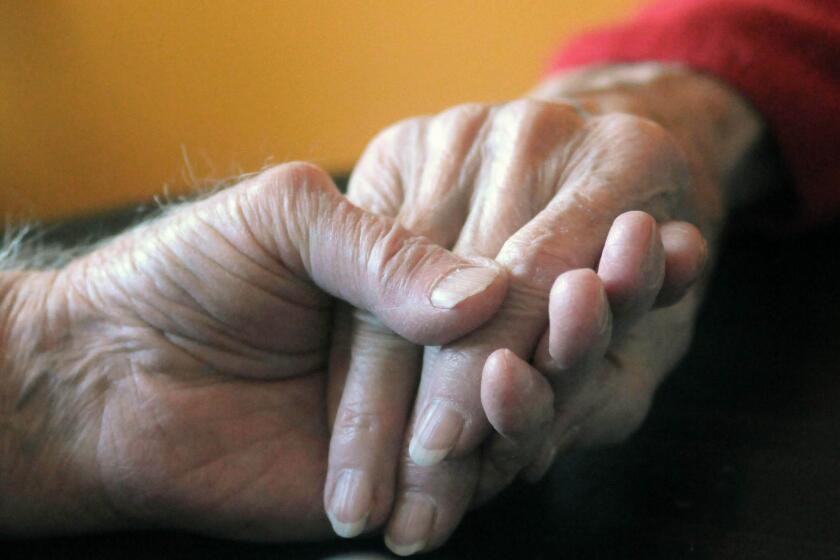For Social Security benefits, playing a waiting game really pays off

- Share via
Dear Liz: My wife and I are both 63. She recently applied for Social Security. I will apply for mine when I am 70, at which time she will apply for a spousal payment, which will be half of mine. Last night as I was in bed I thought, “What if I die before 70?” Can she still wait until what would be my 70th year to collect my maximum benefit?
Answer: Your wife will get a larger survivor benefit because you delayed. If you die after she reaches 66 years and two months, however, she won’t get a larger check by waiting.
Social Security rules can be mind-numbingly complicated, and they’re different for different types of benefits, so this will take some explaining.
The three types of benefits that matter for this discussion are retirement benefits, which are based on your own earnings record; spousal benefits, which are based on a spouse’s earnings record while both partners are alive; and survivor benefits, which are based on a spouse’s earnings record after his or her death.
These benefits may be reduced if you start them before your “full retirement age,” which is different for survivor benefits than for retirement and spousal benefits, said William Meyer, founder of Social Security Solutions, a claiming-strategies site.
If your wife was born in 1957, then her full retirement age for retirement or spousal benefits is 66 years and 6 months. For survivor benefits, it’s 66 years and 2 months.
The full retirement age for retirement and spousal benefits is 66 for those born between 1943 and 1954. People born between 1955 and 1959 have full retirement ages ranging from 66 and 2 months to 66 and 10 months. Those born in 1960 and later have a full retirement age for retirement benefits of 67.
Here are some immediate financial steps to take after a loved one dies. But don’t try to do everything yourself. Consider hiring an estate planning or probate attorney.
With survivor benefits, the schedule is pushed back two years. Survivors born between 1945 and 1956 have a full retirement age of 66. Survivors born from 1957 to 1961 have full retirement ages ranging from 66 and 2 months to 66 and 10 months. Survivors born in 1962 and later have full retirement ages of 67.
The reason you’re waiting to start retirement benefits until 70 is probably because you know your benefit will increase 8% for each year you delay between your own full retirement age and 70, when retirement benefits max out. The 8% per year increases are called delayed retirement credits. As you likely know, delaying is particularly important for the higher earner in a couple because that benefit determines what the survivor gets.
If you start retirement benefits before your full retirement age, your wife’s survivor benefit will be based on what you would have gotten at your full retirement age. If you delay your retirement benefits beyond your full retirement age, your wife’s survivor benefit will reflect any delayed retirement credits you have earned.
Your retirement benefit doesn’t earn delayed retirement credits after you’re dead, however. And your wife won’t earn delayed retirement credits on her survivor benefit. Once she reaches her full retirement age for survivor benefits, there’s no point in further delaying her switch from her retirement benefit to her survivor benefit.
Delayed retirement credits also don’t apply to spousal benefits. Her maximum spousal benefit would be half of your benefit amount as of your full retirement age. Because she started her own benefit early, however, her spousal benefit would be reduced.
The penalties for starting early are significant enough that it’s usually best to wait, and your wife may still have a “do over” option. If it’s been less than 12 months since she applied for benefits, she can repay any benefits she received and withdraw her application. That will undo her previous claiming decision and allow her benefit to keep growing. The claiming calculators and experts at Social Security Solutions and Maximize My Social Security can help you determine if that might be the best course.
Liz Weston, Certified Financial Planner, is a personal finance columnist for NerdWallet. Questions may be sent to her at 3940 Laurel Canyon, No. 238, Studio City, CA 91604, or by using the “Contact” form at asklizweston.com.
More to Read
Inside the business of entertainment
The Wide Shot brings you news, analysis and insights on everything from streaming wars to production — and what it all means for the future.
You may occasionally receive promotional content from the Los Angeles Times.











